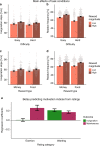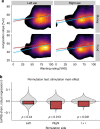Vagus nerve stimulation boosts the drive to work for rewards
- PMID: 32678082
- PMCID: PMC7366927
- DOI: 10.1038/s41467-020-17344-9
Vagus nerve stimulation boosts the drive to work for rewards
Abstract
Interoceptive feedback transmitted via the vagus nerve plays a vital role in motivation by tuning actions according to physiological needs. Whereas vagus nerve stimulation (VNS) reinforces actions in animals, motivational effects elicited by VNS in humans are still largely elusive. Here, we applied non-invasive transcutaneous auricular VNS (taVNS) on the left or right ear while participants exerted effort to earn rewards using a randomized cross-over design (vs. sham). In line with preclinical studies, acute taVNS enhances invigoration of effort, and stimulation on the left side primarily facilitates invigoration for food rewards. In contrast, we do not find conclusive evidence that acute taVNS affects effort maintenance or wanting ratings. Collectively, our results suggest that taVNS enhances reward-seeking by boosting invigoration, not effort maintenance and that the stimulation side affects generalization beyond food reward. Thus, taVNS may enhance the pursuit of prospective rewards which may pave avenues to treat motivational deficiencies.
Conflict of interest statement
The authors declare no competing interests.
Figures






References
-
- Phillips PE, Walton ME, Jhou TC. Calculating utility: preclinical evidence for cost-benefit analysis by mesolimbic dopamine. Psychopharmacology. 2007;191:483–495. - PubMed
-
- Gigerenzer, G. Gut Feelings: The Intelligence of the Unconscious. (Penguin, Park Imperial, 2007).
-
- Han W, et al. A neural circuit for gut-induced reward. Cell. 2018;175:e623. - PubMed
Publication types
MeSH terms
LinkOut - more resources
Full Text Sources
Medical

